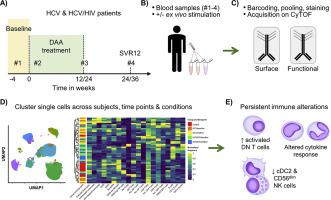Clinical Microbiology and Infection ( IF 10.9 ) Pub Date : 2021-08-30 , DOI: 10.1016/j.cmi.2021.08.018 Jacobus Herderschee 1 , Tytti Heinonen 1 , Craig Fenwick 2 , Irene T Schrijver 1 , Khalid Ohmiti 2 , Darius Moradpour 3 , Matthias Cavassini 1 , Giuseppe Pantaleo 4 , Thierry Roger 1 , Thierry Calandra 1 ,

|
Objectives
Chronic hepatitis C virus (HCV) infection affects the immune system. Whether elimination of HCV with direct-acting antivirals (DAA) restores immunity is unclear. We used mass cytometry to get a broad and in-depth assessment of blood cell populations of patients with chronic HCV before and after DAA therapy.
Methods
Before and 12 weeks after sustained virological response (SVR12) to DAA therapy, 22 cell populations were analysed by mass cytometry in blood collected from ten healthy control individuals and 20 HCV-infected patients with (ten patients) or without (ten patients) human immunodeficiency virus (HIV) infection.
Results
HCV infection altered the frequency of 14/22 (64%) blood cell populations. At baseline, the frequencies (median, interquartile range (IQR); control, HCV, HCV/HIV) of intermediate monocytes (1.2, IQR 0.47–1.46; 1.76, IQR 0.83–2.66; 0.78, IQR 0.28–1.77), non-classical monocytes (1.11, IQR 0.49–1.26; 0.9, IQR 0.18–0.99; 0.54, IQR 0.28–1.77), conventional dendritic cells type 2 (0.55, IQR 0.35–0.59; 0.31, IQR 0.16–0.38; 0.19, IQR 0.11–0.36) and CD56dim natural killer cells (8.08, IQR 5.34–9.79; 4.72, IQR 2.59–6.05) 3.61, IQR 2.98–5.07) were reduced by 35% to 65%, particularly in HCV/HIV co-infected patients. In contrast, activated double-negative T cells (0.07, IQR 0.06–0.10; 0.10, IQR 0.09–0.19; 0.19, IQR 0.12–0.25), activated CD4 T cells (0.28, IQR 0.21–0.36; 0.56, IQR 0.33–0.77; 0.40, IQR 0.22–0.53) and activated CD8 T cells (0.23, IQR 0.14–0.42; 0.74, IQR 0.30–1.65; 0.80, IQR 0.58–1.16) were increased 1.4 to 3.5 times. Upon stimulation with Toll-like receptor ligands, the expression of cytokines was up-regulated in 7/9 (78%) and 17/19 (89%) of the conditions in HCV- and HCV/HIV-infected patients, respectively. Most alterations persisted at SVR12.
Conclusions
Chronic HCV and HCV/HIV infections induce profound and durable perturbations of innate and adaptive immune homeostasis.
中文翻译:

通过大规模细胞术对丙型肝炎病毒感染患者的血细胞进行高维免疫表型分析
目标
慢性丙型肝炎病毒 (HCV) 感染会影响免疫系统。用直接作用抗病毒药物 (DAA) 消除 HCV 是否能恢复免疫力尚不清楚。我们使用大规模细胞术对 DAA 治疗前后慢性 HCV 患者的血细胞群进行了广泛而深入的评估。
方法
在对 DAA 治疗的持续病毒学应答 (SVR12) 之前和之后 12 周,通过质谱流式分析从 10 名健康对照个体和 20 名患有(10 名患者)或没有(10 名患者)人类免疫缺陷的 HCV 感染患者收集的血液中的 22 个细胞群病毒 (HIV) 感染。
结果
HCV 感染改变了 14/22 (64%) 血细胞群的频率。在基线时,中间单核细胞(1.2,IQR 0.47–1.46;1.76,IQR 0.83–2.66;0.78,IQR 0.28–1.77)的频率(中位数,四分位距 (IQR);对照,HCV,HCV/HIV),非经典单核细胞(1.11,IQR 0.49–1.26;0.9,IQR 0.18–0.99;0.54,IQR 0.28–1.77),常规树突状细胞 2 型(0.55,IQR 0.35–0.59;0.31,IQR 0.16–0.38;0.19,IQR 0.11– 0.36) 和 CD56暗淡自然杀伤细胞(8.08,IQR 5.34–9.79;4.72,IQR 2.59–6.05)3.61,IQR 2.98–5.07)减少了 35% 至 65%,特别是在 HCV/HIV 合并感染患者中。相比之下,激活的双阴性 T 细胞(0.07,IQR 0.06–0.10;0.10,IQR 0.09–0.19;0.19,IQR 0.12–0.25),激活的 CD4 T 细胞(0.28,IQR 0.21–0.36;0.56,IQR 0.33–0.77 ;0.40,IQR 0.22–0.53)和活化的 CD8 T 细胞(0.23,IQR 0.14–0.42;0.74,IQR 0.30–1.65;0.80,IQR 0.58–1.16)增加了 1.4 至 3.5 倍。在用 Toll 样受体配体刺激后,细胞因子的表达分别在 HCV 和 HCV/HIV 感染患者的 7/9 (78%) 和 17/19 (89%) 的情况下上调。大多数改变持续到 SVR12。
结论
慢性 HCV 和 HCV/HIV 感染会引起先天性和适应性免疫稳态的深刻而持久的扰动。











































 京公网安备 11010802027423号
京公网安备 11010802027423号